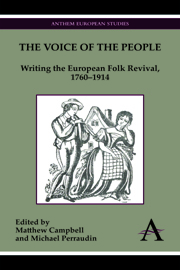Book contents
- Frontmatter
- Table of Contents
- List of Figures
- Introduction
- Chapter 1 The Impact of Ossian: Johann Gottfried Herder's Literary Legacy
- Chapter 2 On Robert Burns: Enlightenment, Mythology and the Folkloric
- Chapter 3 The Classical Form of the Nation: The Convergence of Greek and Folk Forms in Czech and Russian Literature in the 1810s
- Chapter 4 Literary Metamorphoses and the Reframing of Enchantment: The Scottish Song and Folktale Collections of R. H. Cromek, Allan Cunningham and Robert Chambers
- Chapter 5 Thomas Moore, Daniel Maclise and the New Mythology: The Origin of the Harp
- Chapter 6 The Oral Ballad and the Printed Poem in the Portuguese Romantic Movement: The Case of J. M. da Costa e Silva's Isabel ou a Heroina de Aragom
- Chapter 7 Class, Nation and the German Folk Revival: Heinrich Heine, Georg Büchner and Georg Weerth
- Chapter 8 The Estonian National Epic, Kalevipoeg: Its Sources and Inception
- Chapter 9 The Latvian Era of Folk Awakening: From Johann Gottfried Herder's Volkslieder to the Voice of an Emergent Nation
- Chapter 10 From Folklore to Folk Law: William Morris and the Popular Sources of Legal Authority
- Chapter 11 Pioneers, Friends, Rivals: Social Networks and the English Folk-Song Revival, 1889–1904
- Chapter 12 The Bosnian Vila: Folklore and Orientalism in the Fiction of Robert Michel
- Epilogue: The Persistence of Revival
- Bibliography
- Index
- List of Contributors
Introduction
Published online by Cambridge University Press: 05 July 2012
- Frontmatter
- Table of Contents
- List of Figures
- Introduction
- Chapter 1 The Impact of Ossian: Johann Gottfried Herder's Literary Legacy
- Chapter 2 On Robert Burns: Enlightenment, Mythology and the Folkloric
- Chapter 3 The Classical Form of the Nation: The Convergence of Greek and Folk Forms in Czech and Russian Literature in the 1810s
- Chapter 4 Literary Metamorphoses and the Reframing of Enchantment: The Scottish Song and Folktale Collections of R. H. Cromek, Allan Cunningham and Robert Chambers
- Chapter 5 Thomas Moore, Daniel Maclise and the New Mythology: The Origin of the Harp
- Chapter 6 The Oral Ballad and the Printed Poem in the Portuguese Romantic Movement: The Case of J. M. da Costa e Silva's Isabel ou a Heroina de Aragom
- Chapter 7 Class, Nation and the German Folk Revival: Heinrich Heine, Georg Büchner and Georg Weerth
- Chapter 8 The Estonian National Epic, Kalevipoeg: Its Sources and Inception
- Chapter 9 The Latvian Era of Folk Awakening: From Johann Gottfried Herder's Volkslieder to the Voice of an Emergent Nation
- Chapter 10 From Folklore to Folk Law: William Morris and the Popular Sources of Legal Authority
- Chapter 11 Pioneers, Friends, Rivals: Social Networks and the English Folk-Song Revival, 1889–1904
- Chapter 12 The Bosnian Vila: Folklore and Orientalism in the Fiction of Robert Michel
- Epilogue: The Persistence of Revival
- Bibliography
- Index
- List of Contributors
Summary
The European Folk Revival of the mid- to late eighteenth century – the rediscovery, revaluation and emulation of the ancient songs and stories of primitive people – is a literary-cultural phenomenon which had huge consequences. This was a fashionable enthusiasm of a late or post-Enlightenment intelligentsia and reading public which reverberated round the European continent and beyond in the 150 years that followed, not just transforming the forms and subject-matters of poetry, fiction, music and other arts, but also profoundly conditioning the political domain, as it supplied the cultural material – mythologies, originary stories, vernacular traditions – that sustained the great revolutionary ideologies of the nineteenth century. First, Romantics and pre-Romantics articulated their sense of the inadequacy of cosmopolitan rationalism by espousing the cultural productions of ordinary (uneducated, rural) people as repositories of pre-rational truth and authentic experience. Then the nostalgic imitation, collection and study of folksong, folktale, folk custom and folk belief which this engendered became a process of linguistic, historical and mythical identity-formation with practical consequences, as the new nationalism which increasingly destabilised the European political order over the course of the nineteenth century gained its legitimacy from such activity. And at the same time, radical plebeian movements from French Revolutionary times onwards found sustenance in evidence of the cultural autonomy and superiority of ordinary people, in customs and festivals, songs and story-telling. Even if nineteenth-century socialism did not generally seek to root itself in resuscitated systems of myth, its mythologisation of the proletariat had a related intellectual impetus.
- Type
- Chapter
- Information
- The Voice of the PeopleWriting the European Folk Revival, 1760–1914, pp. 1 - 8Publisher: Anthem PressPrint publication year: 2012

